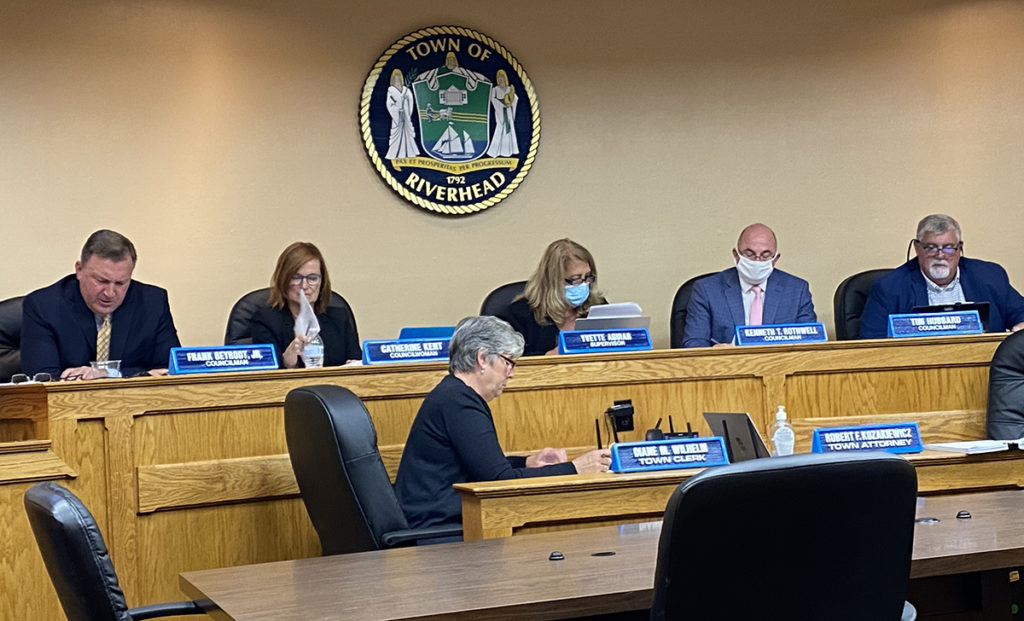Town Board unanimously approves ‘puppy mill’ law

The Riverhead Town Board on Tuesday approved a law to ban the sale of commercially bred dogs, cats and rabbits, completing an effort to curb what some residents have called an “inhumane” and “cruel” practice.
The law aims to break the “puppy mill pipeline” and to “promote animal welfare and encourage best practices in the breeding and purchasing of dogs, cats and rabbits offered for retail sale in the Town of Riverhead,” according to the resolution that was unanimously approved at the Town Board meeting.
“There are few times when you have the opportunity to lead by example,” said Councilman Ken Rothwell, prior to casting his yes vote. “I feel like the State of New York will eventually catch up to us. But when you see an inhumane practice and we have an opportunity to take action, I intend to do that.”
The law makes it unlawful to sell those particular animals unless they were obtained from a town or county animal shelter, animal control agency, a humane society or a nonprofit rescue organization registered with the New York State Department of Agriculture. All pet shops must maintain a certificate of source for each animal and have it available at the request of any official such as a code enforcement officer, according to the resolution.
Councilman Tim Hubbard said the law is a “long time coming and is the right thing to do.”
“I think all of us that sit up here are animal lovers and dog lovers in particular,” he said.
Anyone in violation of the law is subject to a fine of $250-$750 for a first offense, according to the resolution. The fine rises to $500-$1,500 for a second offense. A third offense is considered a misdemeanor with fines ranging between $1,000 and $2,500. Violations of separate animals would be prosecuted separately. The violations could result in jail time as well, with as many as 15 days for a first or second offense and up to 30 days for a third offense.
Councilwoman Catherine Kent said any business built on a model of exploiting animals “should go away.”
“There are certainly plenty of reputable breeders out there,” she said.
Supervisor Yvette Aguiar added: “I never believed in generalizing people. I think this particular legislation may indicate that all pet stores are puppy mills and I am not sure that is the case or not. When legislation is passed at the state and local levels, everyone needs to make sure it doesn’t conflict or supersede laws.
“However, I want to make it perfectly clear that anyone who abuses animals should be prosecuted to the full extent of the law.”
At a public hearing last month, supporters urged the board to pass the law as a way to break the “puppy mill pipeline.”

The board heard from several supporters of the law at Tuesday’s meeting as well, including one Sayville woman who described her experience buying a sick dog from a pet store in Port Jefferson that she said was bred in a puppy mill.
Diane Madden, an animal advocate and co-founder of Hope for Hempstead Shelter, said passing the law would be an example for other municipalities to follow.
“There are so many people watching this board because if you do this, first of all, you’ll be a group of heroes in the animal welfare community,” she said. “But also, we’re going to take what you do and wave it high and set you as an example of what can be done for taxpayers.”
The Humane Society, an animal protection organization, defines a puppy mill as “an inhumane high-volume dog breeding facility that churns out puppies for profit, ignoring the needs of the pups and their mothers.”
Puppy Experience in Aquebogue and Sportsman’s Kennels in Manorville are the two main retail establishments in Riverhead Town the law would affect. Keith Lewin, the owner of Puppy Experience in Aquebogue, said at the hearing that he is already heavily regulated.
Helen Camlakides, the owner of Sportsman’s Kennels, defended her business at Tuesday’s meeting and had several staff members with her in support. She said her business is not a puppy mill and encouraged board members to visit the more than six-acre site. She said they’ve been in business for more than 50 years and her business has a guarantee that exceeds what the state mandates.
“We don’t sell puppies at eight weeks,” she said. “We sell puppies three months at the earliest, most of them are much older.”
She said the law would force residents to go out of state to purchase dogs and would be more likely to get scammed.
After one speaker read a number of critical compliance issues found in a November 2020 inspection report from the U.S. Department of Agriculture, Ms. Camlakides said that occurred when the business had a skeleton crew due to COVID-19 and veterinary notes were not attached to the dog’s contracts. She said one black lab cited for having no hair was due to having given birth recently.
“We take wonderful care of our puppies,” she said.
After the vote, Ms. Camlakides returned to the podium and asked the board to pick “a fair figure” if they intend to minimize the amount she can breed.
“Just don’t kick me out of business 50 years later when I’m 85,” she said.
The law allows for cats obtained by donation from a resident to be sold, however the pet store owner must maintain a certificate of source on file and notify the town in writing of any sale of a donated cat, according to the resolution.








